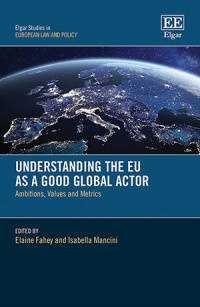Hardback
Handbook of Genocide Studies
Providing an intellectual biography of the challenging concept of genocide, this topical Handbook takes an interdisciplinary approach to shed new light on the events, processes, and legacies in the field.
More Information
Critical Acclaim
Contributors
More Information
Providing an intellectual biography of the challenging concept of genocide from inception to present day, this topical Handbook takes an interdisciplinary approach to shed new light on the events, processes, and legacies in the field.
Reaching beyond the traditional study of canonical genocides and related pathologies of behaviour, this Handbook strives to spell out the multiple dimensions of genocide studies as an academic realm. In doing so, it incorporates a vast range of methods and disciplines, including historiography, archival research, listening to testimony, philosophical inquiry, film studies, and art criticism. Contributors address a broad array of episodes, including genocides of indigenous populations in the Americas and Africa, the Armenian genocide, the Holocaust, twentieth century genocides in Indonesia, Cambodia, Rwanda, Bosnia, and twenty-first century genocides in Iraq, Myanmar, and China. By developing a cross-disciplinary framework, this Handbook showcases the diversity that comprises the field and creates a rich understanding of the origin, effects, and legacy of genocide.
With a wide variety of perspectives, this Handbook will prove an invigorating read for students and scholars of international and human rights, public policy, and political geography and geopolitics, particularly those interested in genocide studies and the UN Genocide Convention.
Reaching beyond the traditional study of canonical genocides and related pathologies of behaviour, this Handbook strives to spell out the multiple dimensions of genocide studies as an academic realm. In doing so, it incorporates a vast range of methods and disciplines, including historiography, archival research, listening to testimony, philosophical inquiry, film studies, and art criticism. Contributors address a broad array of episodes, including genocides of indigenous populations in the Americas and Africa, the Armenian genocide, the Holocaust, twentieth century genocides in Indonesia, Cambodia, Rwanda, Bosnia, and twenty-first century genocides in Iraq, Myanmar, and China. By developing a cross-disciplinary framework, this Handbook showcases the diversity that comprises the field and creates a rich understanding of the origin, effects, and legacy of genocide.
With a wide variety of perspectives, this Handbook will prove an invigorating read for students and scholars of international and human rights, public policy, and political geography and geopolitics, particularly those interested in genocide studies and the UN Genocide Convention.
Critical Acclaim
‘Reflecting the multi-disciplinary nature of genocide studies, this is an advanced Handbook of Genocide Studies, which engages with challenges in the field of genocide studies by examining how particular genocides and aspects of the genocide process impact the study of genocide. Taking the reader through key concepts, such as the birth of the term “genocide”, specific genocides, particular aspects of genocide, and important practical aspects of genocide such as genocide prevention, this is a valuable text for students and scholars of any discipline seeking to explore how we research this challenging field of study.’
– Melanie O’Brien, University of Western Australia and International Association of Genocide Scholars
– Melanie O’Brien, University of Western Australia and International Association of Genocide Scholars
Contributors
Contributors include: Mohamed Adhikari, Charles Anderton, Daniel Conway, Anna DiLello, Amélie Faucheux, Magnus Fiskesjö, Christian Gudehus, Douglas Irvin-Erikson, Aleksandar Jokic, Leora Kahn, Charlotte Kiechel, Ben Kiernan, Stéphanie Khoury, Paul Lowe, David MacDonald, Suren Manukyan, David J. Simon, Amy Sodaro, Kate Temoney, Anton Weiss-Wendt, Elmedin Žunić





